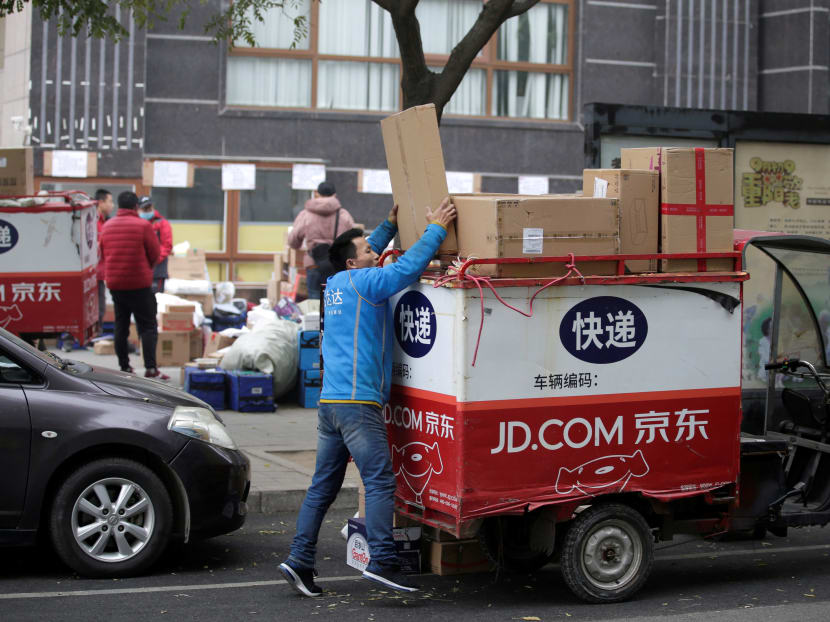Chinese shoppers say they would shun American brands during Singles' Day
BEIJING — The world’s largest online shopping event may be in the grips of a nationalistic fervour, as three in four Chinese consumers say they will avoid US labels, opting for local brands, during Singles’ Day on Nov 11.

A deliveryman packs parcels on the top of a tricycle beside a road after the 11.11 Singles' Day shopping festival in Beijing, China, Nov 14, 2018.
BEIJING — The world’s largest online shopping event may be in the grips of a nationalistic fervour, as three in four Chinese consumers say they will avoid US labels, opting for local brands, during Singles’ Day on Nov 11.
Up to 78 per cent of Chinese consumers said they would avoid buying American brands, opting instead for Chinese products, with more than half of them citing “patriotism” as the main reason, according to AlixPartners, citing a survey of 2,000 adult Chinese consumers.
The result of the survey, conducted between Oct 2 and 7, underscores how the year-long US-China trade war is seeping into the retail industry and changing how consumers in the most populous nation on Earth spend their money. The two countries had slapped tariffs on each other’s products for more than a year, in a tit-for-tat spat that is crimping retail sales and backfiring on their economies.
“Chinese consumers … prefer local brands, and the recent rise in pro-China feeling has only pushed this further,” said AlixPartner’s director Jason Ong in Shanghai. “Local brands have come of age in China; no longer are they scrappy brands with poor product, design, quality, or weak marketing.”
[Workers wrapping packages at a logistics centre in Lianyungang, east China's Jiangsu province on November 8, 2016. Photo: AFP] [Workers wrapping packages at a logistics centre in Lianyungang, east China's Jiangsu province on November 8, 2016. Photo: AFP]
Workers wrapping packages at a logistics centre in Lianyungang, east China's Jiangsu province on November 8, 2016. Photo: AFP
The world’s largest online shopping event may be in the grips of a nationalistic fervour, as three in four Chinese consumers say they will avoid US labels, opting for local brands, during Singles’ Day on November 11.
Up to 78 per cent of Chinese consumers said they would avoid buying American brands, opting instead for Chinese products, with more than half of them citing “patriotism” as the main reason, according to AlixPartners, citing a survey of 2,000 adult Chinese consumers.
The result of the survey, conducted between October 2 and 7, underscores how the year-long US-China trade war is seeping into the retail industry and changing how consumers in the most populous nation on Earth spend their money. The two countries had slapped tariffs on each other’s products for more than a year, in a tit-for-tat spat that is crimping retail sales and backfiring on their economies.
“Chinese consumers … prefer local brands, and the recent rise in pro-China feeling has only pushed this further,” said AlixPartner’s director Jason Ong in Shanghai. “Local brands have come of age in China; no longer are they scrappy brands with poor product, design, quality, or weak marketing.”
Also known as Double 11, the 24 hours of online shopping festival on Alibaba Group Holding’s Taobao, Tmall and AliExpress platforms have evolved into the biggest e-commerce event, eclipsing Amazon.com’s Prime Day, Black Friday or Cyber Monday shopping festivals.
Last year, a record US$30 billion (S$40.8 billion) of goods were transacted on Nov 11, based on the gross merchandise volume (GMV), or value of products traded. That was the largest haul recorded since the event was started in 2009 by Alibaba, which owns South China Morning Post.
China’s slowest quarterly economic growth pace since 1992 has not dampened the enthusiasm of Chinese consumers. Shoppers from the country’s two highest-tiered cities – like Beijing and Chengdu – say they plan to spend 54 per cent more this year at an average of 6,265 yuan (S$1,209.62).
American pop star Taylor Swift is set to headline the 2019 Singles’ Day sales, following in the footsteps of Mariah Carey and actress Nicole Kidman to take Alibaba’s stage.
Still, the avoidance of American brands wouldn’t discourage Chinese consumers from choosing other foreign brands, including those from Europe, Japan and South Korea, especially those that are perceived to be of higher quality and are better designed, according to AlixPartner’s survey. The survey showed that 30 per cent of respondents expect their purchases to be foreign brands.
“Chinese consumers are pragmatic; they will not sacrifice quality simply to buy Chinese products – they are increasingly sophisticated buyers,” Ong said. SOUTH CHINA MORNING POST





